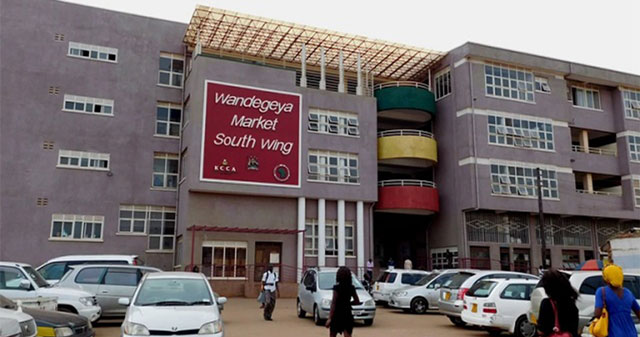
NEWS ANALYSIS | THE INDEPENDENT | The clamor for the management of city markets is far from over given the contracting new directives from President, Yoweri Museveni.
From directing that the markets are run by vendors and backtracking to instruct the City Authority to repossess the markets, Museveni’s directives have not put a close to the management wrangles in St. Balikuddembe alias Owino, Nakasero, and Wandegeya Market among others.
The fights have always rotated around leadership and general management of the affairs of the city markets. The disputes revolve around the allocation of stalls, levying charges for rent, and pricing utilities such as water and electricity.
Museveni’s Directives
In 2009, Museveni started preaching the importance of vendors running their markets. In February 2010, he directed the de-facto Kampala City Council-KCC to stop “selling” city markets to outsiders but pass them to vendors, if they had failed to manage them. At that time, City businessman Hassan Basajjabalaba had secured a contract from KCC to manage Nakasero and Owino markets.
Museveni’s directive led to the cancellation of the contract prompting the government to compensate him billions of Shillings. Following the president’s directive, vendors in Owino and Nakasero markets organized to acquire and redevelop the markets. In April 2014, KCC leased the land comprising plots 24, M34, 20A-22A, and M77B Nakivubo place to St. Balikuddembe Market Stalls, Space and Lock-up Shops Owners Association (SSLOA) for a 99-year lease. The vendor made a payment of a premium of 1.8 billion Shillings and a ground rent of Shillings 45 million.
In 2018, Museveni made a U-turn, directing vendors to return the markets to the local authorities, something that ended up in court battles. Both Nakasero and Owino markets remained in the hands of vendor groups that had acquired lease agreements. In September 2020, President Museveni returned with the same directive that Kampala Capital City Authority-KCCA repossess all government markets, dissolve all conflicting leaderships and organize fresh elections in Kisekka, Wandegeya, Bugoloobi, and St. Balikuddembe commonly known as Owino, Kitintale, Nakawa, Bukoto, and Nakasero markets among others.
The President argued that the existing leaders are subjecting vendors to double taxation and extortion through levying high rental fees and exaggerated utility prices. A section of leaders in the St. Balikuddembe and Nakasero markets opposed the directive and pointed to their lease agreements on the market land. They opted to sue the government and KCCA.
“We attained a court injunction in November (2021) barring KCCA from taking over the land but they defied the order and installed another leadership as they seek to take over the land belonging to traders,” said Umar Buyinza, the Spokesperson of SSLOA then told Uganda Radio Network in an interview.

KCCA forcefully took over management of the markets, prompting another phase of court petitions to deter them from further occupation. But, they proceeded, installing interim leadership in the markets. Although KCCA said that the interim leadership would last only a maximum of six months they have spent more than a year in office.
The planned elections in markets couldn’t be conducted in the absence of a legal framework since the Kampala Markets Ordinance, which had earlier been passed by the Council hit a snag in the Attorney General’s chambers where it had been sent for perusal.
Up to now, the ordinance has not been finalized. Now before the 2020 directives could be fully implemented, the president emerged with new directives requiring KCCA to disband the current leadership and take full management of the markets. KCCA is also to superintend over the reallocation of stalls to ensure that each person has one stall, no one rents out stalls to others and sets affordable market dues.
As KCCA works on the directives, further chaos has stirred up in the markets. Except for Wandegeya, KCCA is yet to take control of the markets and the interim leadership still remains prevalent. On Tuesday, KCCA met with the disbanded markets leadership demanding that they hand over to KCCA and remain as advisers to the authority in what they called a transition period. But the former leaders raised unaddressed grievances fueled by the new directives.
Mayi Nabukenya, the ousted Chairperson of Wandegeya Market is unhappy that she was showed the exit despite being elected as the interim chairperson by vendors. She says the takeover by KCCA has seen her predecessors whom the President also accused of oppressing the vendors, return with a new force to run market affairs.
Godfrey Kayita, who has been the Chairman of the Kisekka market interim committee says that while they have always fought to return the markets to KCCA, throwing them out without resolving their grievances doesn’t solve the conflicts in the market. Kayita says that they shall not sit back while “some” people mismanage the operations of the market.
In Owino Market, the outgoing interim committee chairperson Susan Kushaba had earlier said she wouldn’t leave the market arguing that she claimed the position following a presidential directive that involved a change of leadership.
But on Tuesday, she backtracked saying that she would offer her support to the management of the market even if she holds no position. She, however, insisted that there are people coming with selfish interests and that’s why they have vehemently opposed the interim committees.
The KCCA Executive Director Dorothy Kisaka says that the authority wants to put an end to the grumbling and no conflicted party shall be entertained in the management of the markets. Kisaka says that no member of the disbanded interim committee, their predecessors, or KCCA staff implicated in the mismanagement of affairs shall be reassigned to the markets.
As KCCA moves to repossess all markets, there is concern that court petitions could crop up leading to enormous compensations to vendors who had ownership of some stalls. For instance, in Wandegeya market, there are vendors who entered an understanding with the government to own stalls equivalent to what they owned in previous markets, which were merged to form the redeveloped Wandegeya Market. The time stated in the understanding is yet to elapse. But Kisaka says the current presidential directive takes precedence.
The Market Bill
As Museveni made the last directive, parliament had already passed the Market Bill 2022 which shall guide the management of markets across the country. The president, during a meeting with KCCA officials and Ministers for Kampala, said that he wouldn’t assent to the bill because it contained a provision that provides for Public-Private Partnerships in markets, which he doesn’t agree with. As it stands, the markets are to be run based on the changing presidential directives.
*****
URN
 The Independent Uganda: You get the Truth we Pay the Price
The Independent Uganda: You get the Truth we Pay the Price



The markets in Kampala District could have been supervised by the Ministry Of Kampala not KCCA.